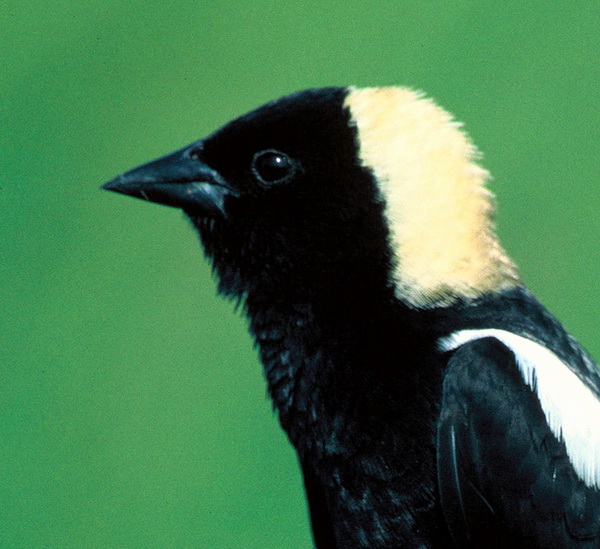ERROR : Server Busy(-1105)
ERROR : Server Busy(-1105)
Bobolink (Dolichonyx oryzivorus) - Wiki
Bobolink
From Wikipedia, the free encyclopedia
[Photo] Cropped from "Bobolink (Dolichonyx oryzivorus); de:Reisst??rling, Bobofink. Creator: S. Maslowski. Source: Fish and Wildlife Service"
The Bobolink, Dolichonyx oryzivorus, is a small New World blackbird and the only member of genus Dolichonyx.
Adults are 16-18 cm long with short finch-like bills. Adult males are mostly black, although they do display creamy napes, and white scapulars, lower backs and rumps. Adult females are mostly light brown, although their coloring includes black streaks on the back and flanks, and dark stripes on the head; their wings and tails are darker.
Their breeding habitats are open grassy fields, especially hay fields, across North America. Females lays 5 to 6 eggs in a cup-shaped nest, which is always situated on the ground and is usually well-hidden in dense vegetation. Both parents feed the young.
These birds migrate to Argentina, Bolivia and Paraguay. They often migrate in flocks, feeding on cultivated grains and rice, which leads to them being considered a pest by farmers in some areas. Although Bobolinks migrate long distances, they have rarely been sighted in Europe.
Bobolinks forage on, or near the ground, and mainly eat seeds and insects.
Males sing bright, bubbly songs in flight; these songs gave this species its common name.
The numbers of these birds are declining due to loss of habitat. Originally, they were found in tall grass prairie and other open areas with dense grass. Although hay fields are suitable nesting habitat, fields which are harvested multiple times in a season may not allow sufficient time for the young birds to fledge. This species increased in numbers when horses were the primary mode of transportation, requiring larger supplies of hay.
Emily Dickinson penned many poems about the bird, such as the following one:The Bobolink is gone - The Rowdy of the Meadow -
And no one swaggers now but me -
The Presbyterian Birds can now resume the Meeting
He gaily interrupted that overflowing Day
When opening the Sabbath in their afflictive Way
He bowed to Heaven instead of Earth
And shouted Let us pray - (The text follows that which is in R.W. Franklin's edition; the numbering is 1620 in Franklin's edition, while it is listed as 1591 in Thomas H. Johnson's.)
http://en.wikipedia.org/wiki/Bobolink
| The text in this page is based on the copyrighted Wikipedia article shown in above URL. It is used under the GNU Free Documentation License. You may redistribute it, verbatim or modified, providing that you comply with the terms of the GFDL. |
|

